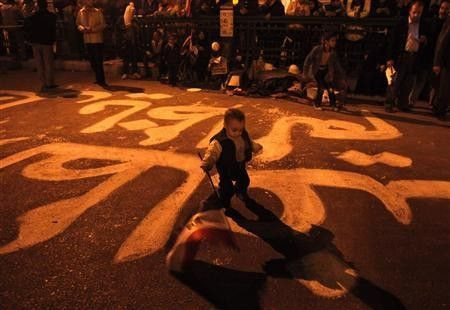Mubarak's retreat a far cry from the real Egypt

Anyone wondering how veteran President Hosni Mubarak lost touch with Egyptian reality needs look no further than this Red Sea resort, where he took refuge after his overthrow last week by a popular uprising.
With its tidy rows of palm trees and wide streets, Sharm el-Sheikh looks more like a Florida suburb than the teeming, polluted industrial cities and crumbling rural villages where most ordinary Egyptians live.
Tourists sunbathe and drink beer openly in a sea breeze that residents say lured the 82-year-old Mubarak to spend more and more time here in the twilight of his 30-year rule, hobnobbing with foreign leaders or recovering from ailments.
His fondness for the remote town, symbolised by his retreat to Sharm el-Sheikh after he was ousted, were signs of his estrangement from Egypt's everyday problems.
Mubarak wanted to try to avoid seeing or hearing what was happening in reality, Nabil Abdel Fattah, an analyst at the al-Ahram Centre for Political and Strategic Studies, said.
This helped lead to a credibility gap between Mubarak and the new generations, especially in Cairo, Alexandria and cities in the Nile Delta like Mansoura.
The security afforded by the sea and mountains at the southern tip of the Sinai Peninsula also made Sharm el-Sheikh a natural spot for Mubarak to host high-profile summits.
The city became a stage for years of fruitless Israeli-Palestinian peace talks. The 2011 Arab Economic Summit was convened at the luxury resort near Mubarak's family villa less than a week before Egypt's demonstrations began.
Nowadays, local gossip has turned from spotting dignitaries such as Kofi Annan and Mahmoud Abbas -- one restaurant owner said he saw Mubarak himself driving alone about eight years ago -- to rumours about the deposed president's health.
Some residents, citing unsubstantiated media reports and local rumour, say Mubarak fell into a coma after the revolution, or became depressed and refused to take medicine.
Saudi-owned daily Asharq al-Awsat said on Tuesday Mubarak's health was deteriorating.
A military source told Reuters Mubarak was breathing but would give no details of his condition. Another source with links to the family said he was not well but did not elaborate.
HISTORY
Property developers, drawn by the Sinai Peninsula's natural beauty, transformed Sharm el-Sheikh from a fishing outpost around a sandy bay into a tourist hub after Israel returned the land to Egypt in the early 1980s.
The peace that followed the 1979 Camp David accords allowed investors to clear landmines left over from three wars with Israel and build a network of hotels, casinos, restaurants, scuba diving centres and bars along the coast.
Many local residents credit Mubarak with their prosperity and tend to talk about the ex-president more like a doddering, isolated father than a heavy-handed dictator.
The last 15 years were bad, but the first 15 were not so bad, said Mahmoud el-Helefy, a 30-year-old restaurant manager, adding that Mubarak seemed to grow more disconnected as he aged.
You know sometimes you talk to old people and they lean in and say, 'what, what?' ... If you can't hear well, you can't think well.
Alaa, another restaurant manager who declined to give his full name, said he viewed Mubarak fondly for the most part and blamed bad advisers for the corruption that enraged protesters.
If you want to know Mubarak and what he did for Egypt, read history, he said.
But many of the almost 50 million Egyptians who have lived their whole lives under Mubarak's reign -- out of a total population of 79 million -- are indifferent to the distant past.
If you see people hurting me, and you don't stop them, then you are hurting me, said Ibrahim Mohamed, 27, a hotel worker.
Mohamed said many of his friends joined demonstrations in Cairo's Tahrir Square, the centre of the protest movement, and he was proud of what they accomplished in less than three weeks.
Widespread Internet access allowed many young Egyptians to watch as the outside world moved forward, adding to frustrations over the lack of serious political reform at home, he added.
We were watching the world outside, he said. I'm a human too. We were created in the same way. So I have to look for the reason. Freedom and democracy -- if you won't give it to me, I will take it. It's my right.
© Copyright Thomson Reuters {{Year}}. All rights reserved.





















